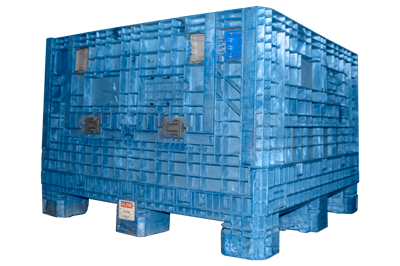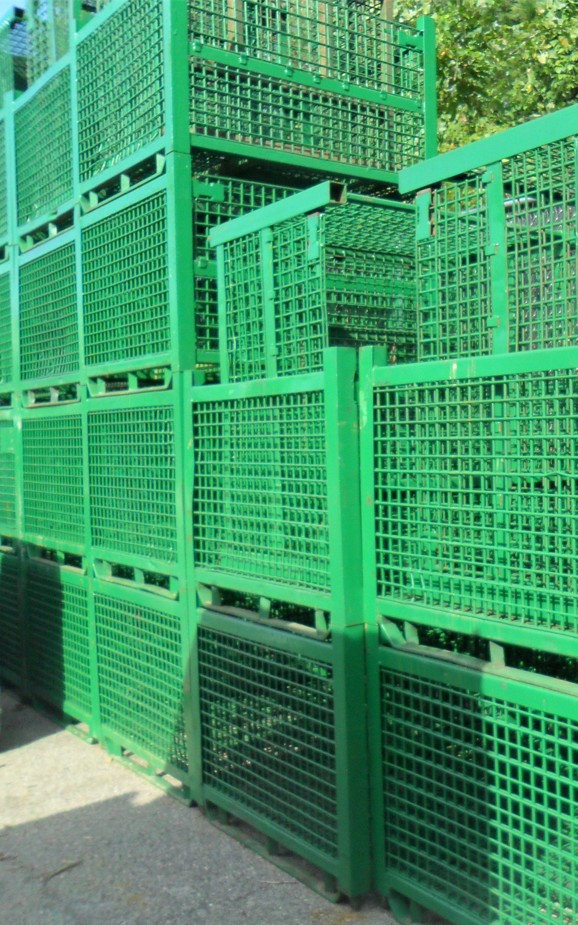Why Mass Containers Are Important for Cost-efficient and sustainable Transportation
Mass containers play an essential role in modern logistics. They help with the reliable motion of big quantities of goods, consequently optimizing transportation processes. This technique not just minimizes costs however also decreases ecological influence through reduced exhausts and waste generation. As industries seek even more sustainable techniques, the fostering of bulk containers is ending up being significantly substantial. What ramifications does this change hold for future logistics and supply chain administration?

The Benefits of Making Use Of Mass Containers in Logistics
Mass containers revolutionize logistics by improving effectiveness and sustainability. These containers allow for the transportation of large quantities of goods in a solitary journey, considerably minimizing the number of journeys called for. This not just streamlines operations however likewise reduces labor expenses connected with handling, packing, and discharging. On top of that, mass containers are made to optimize area utilization within transportation vehicles, ensuring that more items can be delivered all at once.
The standardization of mass containers likewise streamlines the logistics procedure. With uniform dimensions, they can be conveniently piled and saved, leading to boosted storage facility monitoring. Furthermore, mass containers often feature durable materials that protect contents from damage throughout transportation, consequently reducing item loss and increasing total integrity. Because of this, businesses can experience boosted supply chain efficiency, ultimately bring about boosted earnings and customer contentment. This mix of aspects makes bulk containers an essential asset in modern-day logistics.
Environmental Impact: Decreasing Waste and Carbon Impact
As markets increasingly focus on sustainability, the adoption of mass containers has emerged as an essential method for lowering waste and lowering carbon impacts. These containers decrease using packaging products, such as boxes and plastic, thus especially decreasing general waste generation. By settling deliveries, mass containers boost transportation efficiency, enabling even more items to be delivered per trip. This decrease in trips directly associates with reduced greenhouse gas discharges, adding to a smaller sized carbon footprint.
Bulk containers can commonly be recycled or reused, further mitigating environmental impact. The sturdiness of these containers assurances they can stand up to several transportation cycles, minimizing the demand for single-use alternatives. used plastic containers. By streamlining logistics and advertising effective resource use, mass containers not only support lasting practices yet additionally urge markets to line up with worldwide environmental objectives. Inevitably, their execution shows a commitment to ecological stewardship and responsible resource management
Cost Cost Savings: Exactly How Bulk Containers Lower Transportation Expenses
While many firms seek means to improve their bottom line, making use of bulk containers provides a significant chance for reducing transport expenses. Mass containers take full advantage of the volume of items transferred, permitting organizations to ship larger amounts at the same time. This efficiency decreases the number of trips needed, directly decreasing fuel costs and decreasing labor expenses connected with loading and discharging.
Additionally, mass containers frequently feature structured designs that enhance space application within transportation cars. This indicates fewer empty areas, resulting in more reliable use of offered capability. The resilience of bulk containers can lower the threat of item damages throughout transportation, minimizing losses and ensuring that more items get here undamaged.
Enhancing Supply Chain Performance With Bulk Storage Space Solutions
Bulk storage solutions play a necessary duty in enhancing supply chain efficiency by optimizing inventory monitoring. By combining items right into fewer, bigger containers, businesses can substantially lower managing prices connected with constant transfers and processing. This streamlined strategy permits for better monitoring and management of stock, ultimately leading to improved functional efficiency.
Structured Inventory Monitoring
Effective supply management is crucial for optimizing supply chain procedures, particularly when organizations take on bulk storage services. These options enable services to keep higher supply levels while decreasing the regularity of replenishment. By consolidating products into bulk containers, companies can streamline their supply procedures, reducing the intricacy associated with tracking numerous smaller plans. This approach assists in precise inventory counts and boosts forecasting accuracy, allowing for more enlightened decision-making. In enhancement, bulk storage solutions simplify storage facility organization, making it easier to situate and accessibility items when needed. As a result, organizations can attain a much more efficient inventory turnover price, inevitably improving overall supply chain efficiency and lowering the chance of stockouts or overstock scenarios.

Minimized Handling Costs
The execution of mass storage options not only simplifies stock monitoring but also substantially lowers dealing with expenses throughout the supply chain. By consolidating materials into mass containers, firms minimize the need for regular handling and transfer in between various storage space and transport units. This method cuts down on labor expenses related to loading, dumping, and relocating smaller sized bundles. Furthermore, mass storage space lowers the regularity of deliveries, causing reduced transportation expenses and lowered fuel usage. Therefore, organizations can optimize their logistics operations, enabling an extra efficient allocation of resources. Inevitably, lowered dealing with costs contribute to improved general supply chain effectiveness, cultivating an environment that sustains both sustainability and economic feasibility.

Versatility of Mass Containers Across Numerous Industries
Numerous markets have distinctive needs for transportation and storage, bulk containers have arised as a functional solution that satisfies a wide array of demands. These containers, ranging from large containers to specialized containers, can accommodate diverse products, consisting of granules, powders, and liquids. In the agricultural field, mass containers assist in the transport of plant foods and grains, while the food and beverage industry utilizes them for ingredients and finished products. The chemical industry depends on bulk containers for safely carrying harmful materials, making sure compliance with safety policies. Additionally, building firms gain from bulk containers for delivering aggregates and other materials. Their adaptability expands to numerous settings of transportation, including ships, trains, and trucks, improving logistical effectiveness. This adaptability not only improves procedures across different sectors but additionally advertises sustainability by minimizing packaging waste and optimizing room en route. Mass containers play a necessary function in modern-day supply chain management.
Future Fads wholesale Container Usage and Sustainability
The future of mass container use is progressively formed by cutting-edge products advancement that enhances sustainability. Additionally, automation in logistics promises to improve operations, lowering waste and enhancing effectiveness. Embracing round economic situation methods will even more change exactly how bulk containers are developed, made use of, and recycled, fostering an extra lasting transportation landscape.
Innovative Products Advancement
As markets increasingly focus on sustainability, cutting-edge materials growth wholesale containers arises as a significant variable in enhancing environmentally friendly transport services. Makers and researchers are checking out biodegradable plastics, recycled compounds, and lightweight metals to lower environmental effect. These products not just decrease waste but additionally boost gas performance by decreasing the overall weight of containers. Additionally, innovations in smart materials, which can adapt to differing problems, enhance the longevity and functionality of bulk More Help containers. The integration of these ingenious materials lines up with round economic climate principles, promoting reuse and recycling. As the demand for sustainable methods grows, the advancement of such materials will play an essential role fit the future of bulk container use in logistics and transport.
Automation in Logistics
Substantial innovations in automation are positioned to change logistics and the application of mass containers, enhancing sustainability in transport. Automated systems, consisting of drones and independent lorries, are enhancing the motion of bulk containers, decreasing the reliance on conventional fuel-powered transport. These technologies visit their website optimize routing and loading procedures, enhancing and lessening vacant miles gas efficiency. In addition, automated inventory monitoring systems boost monitoring and monitoring of mass containers, making certain better resource appropriation and minimized waste. The combination of the Net of Points (IoT) allows real-time information analysis, making it possible for aggressive decision-making that straightens with sustainability goals. As automation proceeds to progress, it is anticipated to drive additionally developments wholesale container usage, inevitably sustaining more lasting logistics techniques and minimizing the ecological influence of transport.
Round Economic Situation Practices
Developments in automation are setting the phase for a more integrated approach to circular economy practices in the domain name of mass container use. As industries significantly accept sustainability, mass containers are being created for long life and reusability. This shift not just decreases waste but also boosts resource efficiency. Firms are adopting strategies such as closed-loop systems, where made use of containers are gathered, reconditioned, and reestablished into the supply chain. Furthermore, smart modern technologies track container life cycles, assisting in far better management and minimizing ecological influence. The collaboration in between makers, logistics carriers, and end-users is necessary in developing criteria for sustainable container use. used bulk containers. Future fads show an expanding emphasis on materials that are biodegradable and recyclable, further reinforcing the circular economic climate's principles wholesale transportation
Frequently Asked Inquiries
What Materials Are Mass Containers Usually Made From?
Mass containers are usually constructed from durable products such as high-density polyethylene, steel, cardboard, and light weight aluminum. These products provide flexibility, security, and strength, making them appropriate for moving various products in various sectors efficiently.
Exactly how Do I Pick the Right Dimension Bulk Container?
Choosing the ideal dimension bulk container includes reviewing the quantity of products to be moved, considering dealing with devices compatibility, and assessing storage area needs. Correct dimension warranties performance in transport and decreases waste throughout delivery.
Are Mass Containers Reusable or Recyclable?
Bulk containers are typically multiple-use, developed for several journeys, enhancing sustainability. Many can likewise be recycled, relying on the products made use of. Picking recyclable options further lowers and supports ecological goals waste in transportation Homepage practices.
What Safety And Security Regulations Relate To Bulk Container Transport?
Safety and security guidelines for mass container transport include compliance with the Department of Transport standards, appropriate labeling of unsafe products, architectural integrity assessments, and adherence to weight restrictions to ensure safe handling and stop accidents throughout transit.
How Can Companies Change to Making Use Of Mass Containers Properly?
Services can alter to bulk containers by assessing existing logistics, training team on handling, spending in appropriate tools, enhancing supply administration, and teaming up with providers to ensure compatibility and efficiency throughout the supply chain.
As markets significantly prioritize sustainability, the fostering of mass containers has emerged as a vital technique for minimizing waste and lowering carbon footprints. By combining products into bulk containers, business can simplify their inventory processes, lowering the intricacy associated with tracking numerous smaller sized packages. As markets significantly prioritize sustainability, ingenious products advancement in mass containers arises as a significant variable in improving eco-friendly transportation remedies. Automated systems, including drones and self-governing lorries, are improving the motion of mass containers, reducing the reliance on standard fuel-powered transport. Additionally, automated supply monitoring systems boost monitoring and surveillance of mass containers, making certain far better source appropriation and lowered waste.